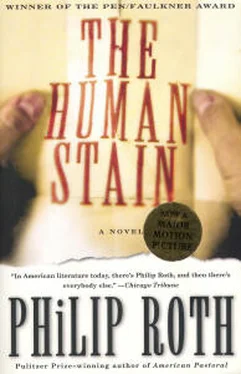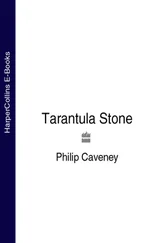Because the Wall is half the size of the Washington Wall, a lot of people are having to kneel down to search for the names and, for the older ones, that makes locating them especially hard. There are flowers wrapped in cellophane lying up against the Wall. There is a handwritten poem on a piece of paper that somebody has taped to the bottom of the Wall. Louie stoops to read the words: “Star light, star bright / First star I see tonight...” There are people with red eyes from crying. There are vets with a black Vietnam Vet cap like Louie's, some of them with campaign ribbons pinned to the cap. There's a chubby boy of about ten, his back turned stubbornly to the Wall, saying to a woman, “I don't wanna read it.” There's a heavily tattooed guy in a First Infantry Division T-shirt—“Big Red One,” the T-shirt says — who is clutching himself and wandering around in a daze, having terrible thoughts. Louie stops, takes hold of him, and gives him a hug. They all hug him. They even get Les to hug him. “Two of my high school friends are on there, killed within forty-eight hours of each other,” a fellow nearby is saying. “And both of them waked from the same funeral home. That was a sad day at Kingston High.” “He was the first one to go to Nam,” somebody else is saying, “and the only one of us to not come back. And you know what he'd want there under his name, at the Wall there? Just what he wanted in Nam. I'll tell you exactly: a bottle of Jack Daniel's, a pair of good boots, and pussy hairs baked into a brownie.”
There is a group of four guys standing around talking, and when Louie hears them going at it, reminiscing, he stops to listen, and the others wait there with him. The four strangers are all gray-haired men — all of them now with stray gray hair or gray curls or, in one case, a gray ponytail poking out from back of the Vietnam Vet cap.
“You were mechanized when you were there, huh?”
“Yeah. We did a lot of humpin', but sooner or later you knew you'd get back to that fifty.”
“We did a lot of walkin'. We walked all over the freakin' Central Highlands. All over them damn mountains.”
“Another thing with the mech unit, we were never in the rear. I think out of the whole time I was there, almost eleven months, I went to base camp when I got there and I went on R&R — that was it.”
“When the tracks were movin', they knew you were comin', and they knew when you were going to get there, so that B-40 rocket was sittin' there waitin'. He had a lot of time to polish it up and put your name on it.”
Suddenly Louie butts in, speaks up. “We're here,” he says straight out to the four strangers. “We're here, right? We're all here. Let me do names. Let me do names and addresses.” And he takes his notepad out of his back pocket and, while leaning on his cane, writes down all their information so he can mail them the newsletter he and Tessie publish and send out, on their own, a couple of times a year.
Then they are passing the empty chairs. They hadn't seen them on the way in, so intent were they on getting Les to the Wall without his falling down or breaking away. At the end of the parking lot, there are forty-one brownish-gray old metal bridge chairs, probably out of some church basement and set up in slightly arced rows, as at a graduation or an award ceremony — three rows of ten, one row of eleven. Great care has been taken to arrange them just so. Taped to the backrest of each chair is somebody's name — above the empty seat, a name, a man's name, printed on a white card. A whole section of chairs off by itself, and, so as to be sure that nobody sits down there, it is roped off on each of the four sides with a sagging loop of intertwined black and purple bunting.
And a wreath is hanging there, a big wreath of carnations, and when Louie, who doesn't miss a thing, stops to count them, he finds, as he suspected, that the carnations number forty-one.
“What's this?” asks Swift.
“It's the guys from Pittsfield that died. It's their empty chairs,” Louie says.
“Son of a bitch,” Swift says. “What a fuckin' slaughter. Either fight to win or don't fight at all. Son of a fuckin' bitch.”
But the afternoon isn't over for them yet. Out on the pavement in front of the Ramada Inn, there is a skinny guy in glasses, wearing a coat much too heavy for the day, who is having a serious problem — shouting at passing strangers, pointing at them, spitting because he's shouting so hard, and there are cops rushing in from the squad cars to try to talk him into calming down before he strikes out at someone or, if he has a gun hidden on him, pulls it out to take a shot. In one hand he holds a bottle of whiskey — that's all he appears to have on him. “Look at me!” he shouts. “I'm shit and everybody who looks at me knows I'm shit. Nixon! Nixon! That's who did it to me! That's what did it to me! Nixon sent me to Vietnam!”
Solemn as they are as they pile into the van, each bearing the weight of his remembrances, there is the relief of seeing Les, unlike the guy cracking up on the street, in a state of calm that never before existed for him. Though they are not men given to expressing transcendent sentiments, they feel, in Les's presence, the emotions that can accompany that kind of urge. During the course of the drive home, each of them — except for Les — apprehends to the greatest degree available to him the mystery of being alive and in flux.
He looked serene, but that was a fakeout. He'd made up his mind. Use his vehicle. Take them all out, including himself. Along the river, come right at them, in the same lane, in their lane, round the turn where the river bends.
He's made up his mind. Got nothin' to lose and everything to gain. It isn't a matter of if that happens or if I see this or if I think this I will do it and if I don't I won't. He's made up his mind to the extent that he's no longer thinking. He's on a suicide mission, and inside he is agitated big-time. No words. No thoughts. It's just seeing, hearing, tasting, smelling — it's anger, adrenaline, and it's resignation. We're not in Vietnam. We're beyond Vietnam.
(Taken again in restraints to the Northampton VA a year later, he tries putting into plain English for the psychologist this pure state of something that is nothing. It's all confidential anyway. She's a doc. Medical ethics. Strictly between the two of them. “What were you thinking?” “No thinking.” “You had to be thinking something.” “Nothing.” “At what point did you get in your truck?” “After dark.” “Had you had dinner?” “No dinner.” “Why did you think you were getting into the truck?” “I knew why.” “You knew where you were going.” “To get him.” “To get who?” “The Jew. The Jew professor.” “Why were you going to do that?” “To get him.” “Because you had to?” “Because I had to.” “Why did you have to?” “Kenny.” “You were going to kill him.” “Oh yes. All of us.” “There was planning, then.” “No planning.” “You knew what you were doing.” “Yes.” “But you did not plan it.” “No.” “Did you think you were back in Vietnam?” “No Vietnam.” “Were you having a flashback?” “No flashbacks.” “Did you think you were in the jungle?” “No jungle.” “Did you think you would feel better?” “No feelings.” “Were you thinking about the kids? Was this payback?” “No payback.” “Are you sure?” “No payback.” “This woman, you tell me, killed your children, ‘a blow job,’ you told me, ‘killed my kids’—weren't you trying to get back at her, to take revenge for that?” “No revenge.” “Were you depressed?” “No, no depression.” “You were out to kill two people and yourself and you were not angry?” “No, no more anger.” “Sir, you got in your truck, you knew where they would be, and you drove into their headlights. And you're trying to tell me you weren't trying to kill them.” “I didn't kill them.” “Who killed them?” “They killed themselves.”)
Читать дальше












